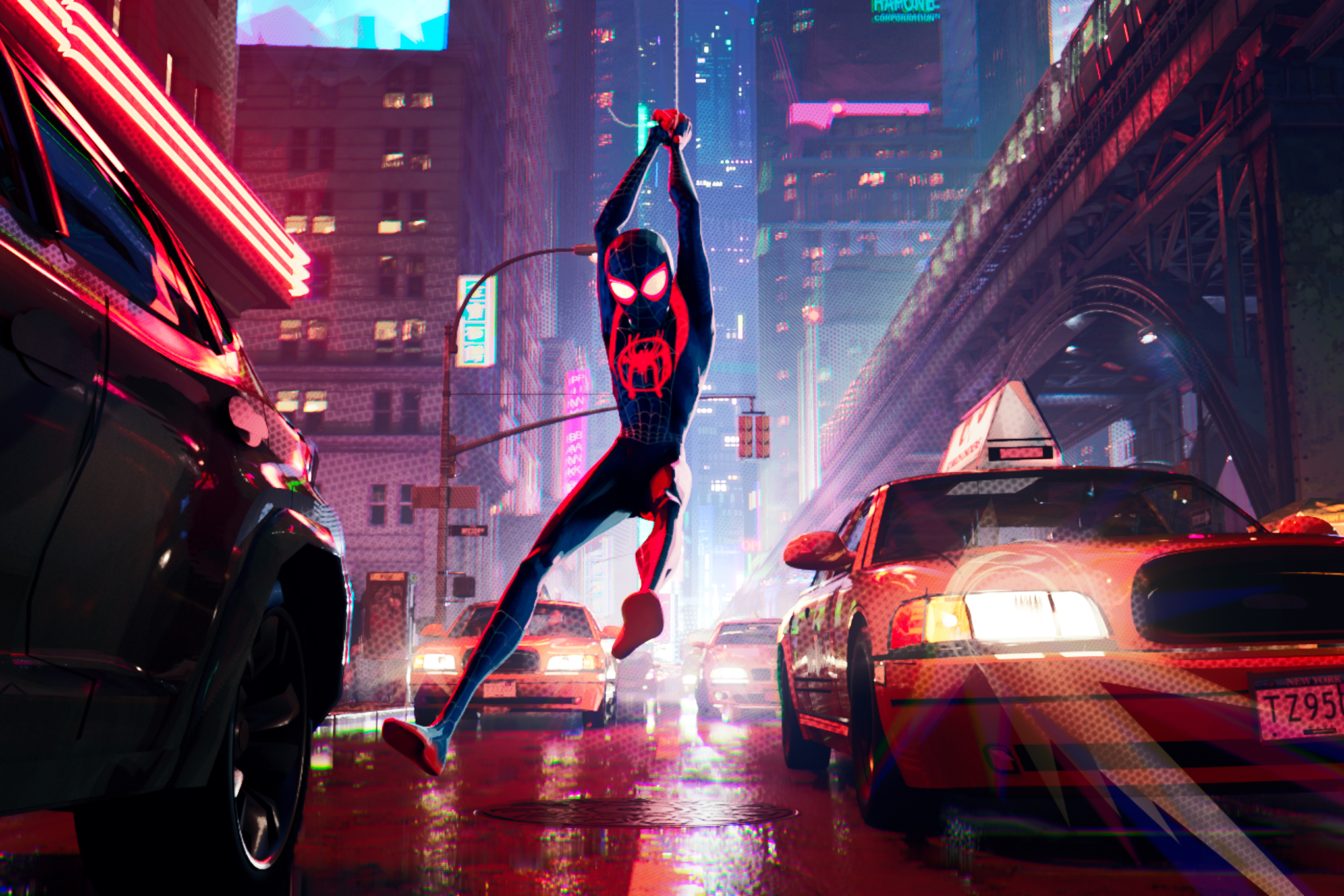I am outspoken in my disdain for cookie-cutter action hero movies. OH NO! Inter-galactic space worm coming to destroy our planet? Who will save us? Maybe the latest indestructible super hero will arrive in the nick-of-time?!? Meh.
But, Spider-Man: Into the Spider-Verse is a totally different bag o’ tricks. Sure, it has grossed almost $400 million so far, and it’s generally been well-received by critics and audiences alike. But who cares about box, and general receptivity? I mean, the current Marvel megalopolis is adored by one and all, how could this possibly be any different than that? Well, first, it’s Animation Oscar is a key indication that we are looking at a gorgeous, and innovative movie. Second, is that this is a story for a differentiating viewer. Sure, it’s a radical statement on race, and gender, but it’s also extraordinarily well written.
Set in a shared “multiverse” called the “Spider-Verse,” this computer-animated film follows the story of teenager Miles Morales (Shameik Moore) as he takes over after Peter Parker’s death as Spider-Man. Along his travels he meets other Spider-people from parallel universes. (Getting my adoration for the movie yet?) And by killing off Peter Parker, and allowing a number of random, normal individuals take the helm, the film makers are saying something intriguing and daring within the tired and worn out super hero movie.
I’ll be honest, as I don’t track super hero movies actively, I didn’t understand what the Spider-Verse was all about. But, woah, was I blown away when I finally got around to watching it. The Washington Post commends the vocal work in the film, and the diversity of the cast and characters. We get to see Spider-Woman (Hailee Steinfeld), Doctor Octopus (Kathryn Hahn), The Kingpin (Liev Schreiber), and a lot of other kooky characters. There’s a reference to the mecha-inspired Japanese Spider-Man (Kimiko Glenn), a funny animal Spidey (John Mulaney), and even a Noir Spider-Man (Nicolas Cage). The movie has no issue laughing at itself, and the larger state of the super hero union.
By choosing to depart from the Peter Parker storyline and exploring other corners of the huge Spider-Man universe, the filmmakers also expanded its potential audience. And sure, in today’s ultra-sensitive climate, it might be easy to accuse the film of riding the social justice wave; but there is more to the film than pandering to non-white audiences. In fact, Into the Spider-Verse’s best achievement is its tongue-in-cheek approach to the material and irreverent playfulness. It’s a departure from the sobering seriousness of the most recent Marvel movies, especially the latest Avengers finger snap film. Cough.
Into the Spider-Verse also delves in a world where not only superheroes, but also an ‘idea’ of superheroes exist. In a metafictional twist, Miles Morales reads Spider-Man comics. While most superhero movies make the ‘normal’ people blur into the background, Into The Spider-Verse descends to the audience through Miles’ eyes. It demystifies Spider-Man and blurs the line between the ordinary and the extraordinary. By loosening the rules, it feels like going to a cinematic playground.
This demystification can be enthralling, especially today when superheroes are practically everywhere. We see them in toys, food, clothing, video games, and other media. These titles and countless others in the genre signify that superhero mania is still showing no signs of slowing down in spite of its over-saturatedness. The New Yorker Magazine even went so far as to call superhero stories a “secular religion.” People are still going crazy for these tales, and this unceasing fascination has become part of our everyday cultural backdrop.
Into the Spider-Verse plays precisely with this superhero-saturated landscape and depicts a world not entirely different from ours. In the movie, cultures and sensibilities permeate into the narrative without friction. The audience gets to indulge in a playful mishmash of characters and stories that do not have to make strict logical or canonical sense.
The film comes off as a reaction to the dominance of high and mighty superheroes in Hollywood. Most of MCU’s releases culminate in fights between evil aliens and a cabal of good-looking crusaders. This time, watching silly characters horse around with their powers can be refreshing. And die-hard Spider-Man fans might tell you that this playfulness is precisely what drew, and continues to draw, them to the franchise. When Miles Morales met his idol in the movie, he realized that there is more to being Spider-Man than swinging around New York City and beating up bad guys. Here we have a reiteration of the classic ‘with great power comes great responsibility’ axiom, but now the responsibility is not simply to fight evil. Themes such as camaraderie, understanding one’s role in the society, and having fun are brought in.
Into the Spider-Verse has all the trappings of a standard superhero movie, but refuses to bury itself under the weight of its own canonical lore. It’s a genuine feel-good movie that harks back to Spider-Man’s campy roots, that had me genuinely rooting for a super hero all over again. And that is literally enough for me to recommend this movie to you guys.
Edited by, CY


